.
.
Intentionally or unintentionally, Kevin Smith may be possibly the easiest person to interview in show business. The 39-year-old writer/director/actor/producer/editor characteristically jumps into an interview situation with a long dialogue that answers any possible question about what he’s promoting or allows the interviewer to ask a question or two that eventually gives the same result.
The man known to many fans as Silent Bob in the Jay and Silent Bob series is anything but silent during interviews, steering the conversation, but in an endearing and entertaining way. In the same way he does with his “An Evening with Kevin Smith” speaking engagement series, which his Cop Out star Seann William Scott says is less a speaker series and more the funniest stand-up he’s ever seen, Smith is a master storyteller and almost always allows a polite bonus question or two at the end to make sure he covered everything.
The only thing he didn’t have much to say about was his recent highly-publicized dismissal from a Southwest Airlines flight for being over the weight limit, to which he spent the better part of the week Twittering and giving soundbytes for, which takes away some focus from the task at hand. He groans, “I’ve exhausted myself talking about it, but if there’s anything you want to know about Cop Out…”
And with that, he pours himself a glass of water and launches into his experiences with his new film starring Bruce Willis and Tracy Morgan. Here are some highlights:
On just being a director this time: “I didn’t want to come in and be like, “Let’s change everything and turn it into a Kevin Smith movie.” Because part of the whole idea of the exercise was can I come in and not make a Kevin Smith movie? After 15 years, I know I can make a Kevin Smith movie, I can make one in my sleep which was kind of the problem in the end – I started doing that. So I just wanted to see if after 15 years I was a director or if I was just a guy who made Kevin Smith movies. And making Cop Out was kind of a way to see if I could do that, so I was going to skate on their ice, so to speak, and had to kind of play according to the rules so I didn’t feel free to go in and be like, “I just should change everything.” I really tried to play the ball where it laid.”
On editing: “They were really nice about letting me edit the film which I think most studios are kind of leery about…I cut the whole flick and whatnot and then we had our test screening, test screening went very well, and the studio was like, “OK, so we’re going to let an editor look at the movie now.” And I was like, “What? What do you mean? Why? We just tested it; everything’s fine.” And they were like you yeah, but you said you didn’t have to be the last hands and I was like, “I didn’t mean that! Nobody means that. If you let another editor touch this that’s like letting someone else fuck my wife.” And I said that in a room full of WB execs and they all looked at each other like, “Ugh, here it comes.” And they were just like, “Kevin it’s not like fucking your wife- it’s the editing of a movie.” I never get validated as an editor. Editing for me is a way of doing another draft and since I didn’t write this movie at all, I thought it was really important that I did the last draft by way of editing.”
On the script: “I read it with an eye toward directing and I was like, “Wow, man, it’s not that difficult.” It intimidated me at first, I’m like, “Oh, it’s action-comedy and stuff.” But then when I read it, I was just like, “It’s just two dudes talking to each other and that’s what I do all the time.” And there were like three tentpole moments and those days I’d have to come to work a little more serious and perhaps a little less chatty than I normally do and just concentrate on shooting action. And if I do that then the rest is just Clerks with cops: two dudes in cars, sitting and talking to each other.”
On the prospect of directing Bruce Willis: ““I meet with [producer] Marc Platt and [he] goes, “What do you think about Bruce Willis?” And I was like, oh, I’d suck a dick to work with Bruce Willis. He says, “You won’t have to go that far in this movie but good to know.” I was like shocked that I was still allowed to be involved in the film based on the fact that Bruce is a fucking huge movie star and shit and I’ve never worked with a big movie star before. Please don’t tell Ben Affleck I said that.”
On growing: “You’ve just got to think, ‘Man, the dude who made Clerks made [this]. That shows growth. Granted it took 15 years, but it shows some growth. I feel complex about the whole thing, because I’m like, “Should I be so proud of myself for fighting so hard to make what is essentially an average-looking film?” Like, it finally looks like the average movie looks. For years my shit didn’t look like average movies, they barely looked like films. For years people would be like, “You’re not a director!” on the Internet and that would hurt my feelings but they were right. They were right. They were total dickheads for saying it but they were right.” Because I wasn’t a director. I was a director on Cop Out because I came in, I had a script and I was like, “OK, this is how we execute this and there’s visual components and whatnot.” Mapped it out, had storyboards, shit like that. The other movies – they weren’t films, they weren’t movies, they were just me ripping open my chest, pulling out fatty chunks of my heart, slapping it between two platters, projecting it, and being like, “What do you think?” And that’s not cinema, that’s blog-esque cinema.”
On being OK directing a script that’s not his own: “With the podcasts – with SModcast (smodcast.com), with the Twitter account where I get to sit there and talk to people, express myself and be me, all the Q&As I do, and shit like that, I don’t feel the need to put as much of me into the films anymore. In the beginning, it was like, “This is the only way I can express myself.” Now, 15 years later, I can express myself in all different ways. So I don’t feel the need to be in the flicks be the same guy who I was 10 years ago. I can be that guy on SModcast or at the Q&A or something like that. So in the movies I’m actually kind of interested, for the next few years, in making movies that look like traditional movies and shit like that. So that when I die, in the next two to five years, people aren’t going to be like, “You know, man, he only made Kevin Smith movies.” I’d like to make a few movies before I die, too.”
.
The interview conducted and written by Paul Salfen










